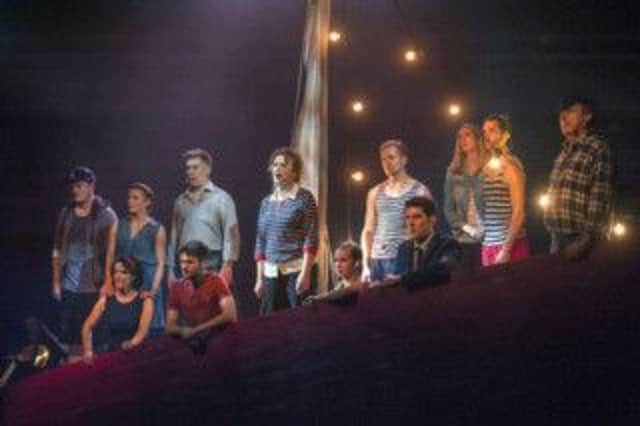Jim Gilchrist: Spirit of the age reflected


Accordingly, the spirit of 2014 was uniquely portentous, simmering with political and cultural excitement, and Scotland’s music responded accordingly.
The Yes campaign drew strongly on folk music’s traditional role of political protest and rallying cry while, stimulating discussion across the country, literary figures like William McIlvanney and Neal Ascherson bussed around with musicians such as Karine Polwart, Ricky Ross and Rod Paterson.
Advertisement
Hide AdThe Bella Caledonia pro-independence website organised a major Songs for Scotland event at Glasgow’s Òran Mor and an associated downloadable album, featuring Dick Gaughan, Siobhan Miller, Eddi Reader and many others.
If the campaign was essentially forward looking, it could be argued that the last thing required were hoary old battle narratives, but there was no avoiding the 700th anniversary of Bannockburn and, in fact, it resulted in an impressive large-scale work, The Bruce 700, from master piper and Gaelic scholar Allan MacDonald. Meanwhile, the First World War’s paradoxical legacy of fine pipe music was observed by a concert series at Glasgow’s College of Piping.
On a happier note, the Commonwealth Games prompted an imaginative associated programme of cross-cultural and cross-genre music-making. The Highland band Breabach, for instance, collaborated with indigenous musicians from Australia and New Zealand in Boomerang, while the folk supertrio Lau enlisted the contemporary-classical strings of the Elysian Quartet. Scots jazzers got on the starting blocks as well, with clarinettist Dick Lee’s engaging suite, The Games, while saxophonist Paul Towndrow mixed professional and amateur forces in his big-band excursion The Pro-Am Suite.
Composer Jim Sutherland initiated an ambitious two-year project, Struileag, celebrating the Gaelic diaspora with a website and a large scale production, Children of the Smoke, on Glasgow Green. Perhaps the single most striking musical manifestation of the Games, however – and surely a sign of the times – was South African soprano Pumeza Matshikiza’s poised rendition of Hamish Henderson’s Freedom Come All Ye, broadcast to a global audience during the opening ceremony – a spectacular if late-in-the-day recognition of both song and composer (and of the Scots tongue).
The summer also saw musical and physical theatre combine in Grit, an acclaimed celebration, on Mull and at Glasgow’s Tramway, of the life and music of the influential piper, fiddler and composer Martyn Bennett, conceived by Cora Bissett and Kieran Hurley.
Other notable folk ventures included Mike Vass’s In the Wake of Neil Gunn seagoing project while, from a different tradition, fiddler Iain MacFarlane’s Miorbhail nam Beann celebrated the poetry of the 18th century Gaelic bard Duncan Ban MacIntyre.
Advertisement
Hide AdOn a smaller scale, but sending surprisingly widespread ripples, the rousing Walking on the Waves, by the West Highland band Skipinnish, topped the World Music download charts within hours of a Sky News interview.
On the jazz front, the potent duo of saxophonist Tommy Smith and pianist Brian Kellock had their winning way with standards in the widely praised album Whispering of the Stars, while Smith steered the Scottish National Jazz Orchestra through numerous fruitful collaborations, not least releasing their American Adventure album, and Bobby Wellins’s Culloden Moor Suite, as well as touring with such diverse stylists as Kurt Elling, the Yellowjackets and Makoto Ozone.
Advertisement
Hide AdOther Scottish jazz releases included bassist Euan Burton’s Too Much Love, while notable visitors included Nordic saxophonist Jan Garbarek in his final collaboration with the Hilliard Ensemble, fellow Norwegian pianist Tord Gustavsen with his sublime quartet and Irish songstress Christine Tobin with her remarkable Leonard Cohen show.
Folk releases ranged in style from fiddler Chris Stout and harpist Catriona McKay recording Sally Beamish’s elementally evocative Seavaigers with the Scottish Ensemble, to more traditional offerings such as Malinky singer Fiona Hunter’s first “solo” album and an intriguing first offering, Shift, from the emerging Kirsty Law.
Elsewhere actress and playwright Gerda Stevenson added to her family’s musical credentials with her first album, Night Touches Day, fiddler Gavin Marwick’s Journeyman project culminated in a tour, a double album and a tunebook while, in her 80th year, Peggy Seeger demonstrated continuing vigour and percipience with the contemporary-sounding Everything Changes.
Silenced were the sublime voice of Jean Redpath and the creative fire of jazz-rock bassist Jack Bruce, while the sudden death of Shetland music activist Davie Henderson was a sore blow to the islands. Just this month, the passing of Sheila Stewart, last of the Stewarts of Blair, marked the end of an era for Scotland’s song-rich traveller culture.
To close the year on a forward-looking note, however, this month Greentrax released yet another compilation, but one with a worthy aim. Favourite Scottish Songs: For a’ the bairns and awbuddie else is a budget-priced album designed for use in schools, its contents ranging from the version of A Man’s a Man delivered at the opening of the Scottish Parliament by Sheena Wellington to more contemporary material such as Karine Polwart’s Follow the Heron. And yes, The Freedom Come All Ye is in there, sung by the late Jim Reid.
Some may regard the sub-title as ower couthie, but don’t be deceived; these are songs of pith and power, wholly in keeping with the spirit of the age.